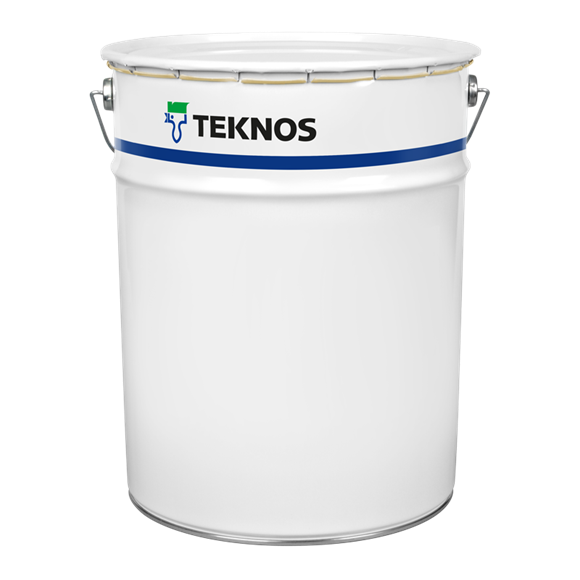TEKNOPLAST PRIMER 3
Epoxy primer

- Chemical resistant
- Wear resistant
- 2-component
- Solvent-borne
- Intermediate
- Primer
TEKNOPLAST PRIMER 3 is a two-pack solvent-borne epoxy primer.
Used as primer in abrasion and chemical resistant coating systems on blast-cleaned steel. Can also be used for priming on zinc, aluminium, thin-plate, acid-proof steel and cast iron surfaces. Used as an intermediate coat over zinc epoxy and zinc silicate primers. The paint is quickly overcoatable and is therefore suited to a fast painting tempo. It is also suitable for application by twin-feed spray. The paint withstands heavy abrasion, oils, grease, solvents and chemicals. TEKNOPLAST WINTER HARDENER 7212 is to be used when painting at temperatures below +10°C .
Surface preparation
Remove from the surfaces any contaminants that might be detrimental to surface preparation and application. Remove also water-soluble salts by using appropriate methods. The surfaces are prepared according to the different materials as follows:
STEEL SURFACES: Remove mill scale and rust by blast cleaning to preparation grade Sa 2½ (standard ISO 8501-1). Roughening the surface of thin-plate improves the adhesion of the paint to the substrate.
ZINC SURFACES: Hot-dip-galvanized steel structures that are exposed to atmospheric corrosion can be painted if the surfaces are sweep blast-cleaned (SaS) till matt all over. Suitable cleaning agents are, e.g. aluminium oxide and natural sand. It is not recommended according to standard ISO 12944-5 to paint hot-dip-galvanized objects that are subjected to immersion strain. Painting of hot-dip-galvanized objects that are subjected to immersion strain must be discussed separately with Teknos.
It is recommended that new zinc-coated thin-plate structures are treated with sweep blast-cleaning (SaS). Thin-plate surfaces that have been weathered to matt can be treated also with RENSA STEEL washing agent.
ALUMINIUM SURFACES: Treat the surfaces with RENSA STEEL washing agent. Surfaces that are exposed to weathering are also roughened up with sweep blast-cleaning (AlSaS) or sanding.
OLD PAINTED SURFACES SUITABLE FOR OVERCOATING: Any impurities that might be detrimental to the application of paint (e.g. grease and salts) are removed. The surfaces must be dry and clean. Old, painted surfaces that have exceeded the maximum overcoating time are to be roughened as well. Damaged parts are prepared in accordance with the requirements of the substrate and the maintenance coating.
The place and time of the preparation are to be chosen so that the prepared surface will not get dirty or damp before the subsequent treatment.
Additional instructive information for surface preparation can be found in standards EN ISO 12944-4 and ISO 8501-2.
Prefabrication primer: KORRO E Epoxy, KORRO SE Zinc Epoxy and KORRO SS Zinc Silicate Prefabrication Primers can be used, when required.
Application
Take into consideration the pot life of the mixture when estimating the amount to be mixed at a time. Before application the base and hardener are mixed in right proportion. Stir thoroughly down to the bottom of the vessel. Inadequate stirring or incorrect mixing ratio results in imperfect curing and impaired film properties.
Stir thoroughly before use. Apply preferably by airless spray as only this method provides the recommended film thickness in a single operation. Suitable airless nozzle size 0.013 - 0.019". Brush or roller can be used for touching up and painting small areas.
When twin-feed spray is used for application, the mixing ratio of the dosage pump must be 4:1. The feed pump pressure and the consumption of components is to be checked during application to ensure of the correct mixing ratio. The components cannot be thinned if twin-feed spray with fixed ratio is used.
Application conditions
The surface to be treated must be dry. During the application and drying period the temperature of the ambient air, the surface and the product shall be above +10°C and the relative air humidity below 80%. Additionally, the temperature of the surface to be treated and the product must be at least +3°C above the dew point of the ambient air.
When using TEKNOPLAST WINTER HARDENER 7212 the temperature of the ambient air and the surface to be painted shall be over -5°C. The temperature of the paint during the mixing and application is to be above +15°C.
Storage
The storage stability is shown on the label. Store in a cool place and in tightly closed containers.
| Total mass of solids | abt. 910 g/l |
|---|---|
| Volatile organic compound (VOC) | abt. 445 g/l |
| Volatile organic compound (VOC) | (For mixed product, base and hardener ratio 4:1.) Approx. 440 g/l (Theoretical, according to IED 2010/75/EU) 380 g/l (Tested according to China GB/T 23985-2009). |
| Pot life | 4 h (+23 °C) |
| Mixing ratio | 4:1 by volume (comp. A : comp. B) |
| Hardener | Comp. B: TEKNOPLAST HARDENER |
| Gloss | Semi-matt |
| Practical spreading rate | The values depend on the application technique, surface conditions, overspray, etc. |
| Drying time – dust free | 1 h (ISO 9117-3:2010) |
| Drying time – touch dry | 4 h (ISO 9117-5:2012) |
| Thinner | Standard thinner: TEKNOSOLV 9506. |
| Clean up | TEKNOSOLV 9506 or TEKNOSOLV 9530. |
| Colours | Red, yellow, grey and white. |
| Safety markings | See safety data sheet. |